
Digitizing Czechia: Outlining ways forward
Last week, government representatives and AmCham experts discussed how the pandemic served as the necessity that forced both government and companies to invent new and better ways to work - and how digitization was a primary tool in that reconstruction. In cooperation with the Institute for Politics and Society, we covered the waterfront on digitization: from healthcare to mobile office to 5G to cloud computing to manufacturing to education. Much has been done and much more needs to be done.
 In health care, Minister Adam Vojtěch said the government plans to push the Act on E-Health through to presidential signature. He said that the crisis forced a very atomized system to centralize, and centralization will need to continue if the providers are going to meet the objective of complete digitization. "The pandemic has shown us how important it is to have an e-prescription and an e-incapability-to-work certificate." Talking in detail about the current legislation in the pipeline, it addresses among others the electronic identity of GPs, the setting of registries which are not yet interconnected, the interconnection of health care workers, health care providers, patients. Telemedicine has proven to be an important complement to the provision of health services. “Alongside digitization, I consider telemedicine to be the second most important issue,” he added.
In health care, Minister Adam Vojtěch said the government plans to push the Act on E-Health through to presidential signature. He said that the crisis forced a very atomized system to centralize, and centralization will need to continue if the providers are going to meet the objective of complete digitization. "The pandemic has shown us how important it is to have an e-prescription and an e-incapability-to-work certificate." Talking in detail about the current legislation in the pipeline, it addresses among others the electronic identity of GPs, the setting of registries which are not yet interconnected, the interconnection of health care workers, health care providers, patients. Telemedicine has proven to be an important complement to the provision of health services. “Alongside digitization, I consider telemedicine to be the second most important issue,” he added.
Investments in the field of healthcare and digitization are planned within the Digital Czechia Strategy and the Czech National Recovery Plan (NPO). There are 14 reform projects with 2.8 billion CZK allocated, incorporated into the NPO from the strategy. Also, the law expects healthcare providers to move to full digitization in 10 years (according to one of the amendments, it could be even in 5 years). It is important to focus on the digitization of the field, ie outpatient health care providers, GPs, primary care, etc.
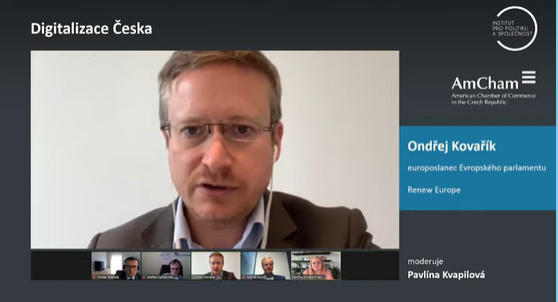 According to MEP Ondřej Kovařík, Health Minister Vojtěch listed a number of areas that were not only a problem at the national level, but also at the level of the entire EU. “When the pandemic arrived in individual states, coordination between Member States proved to be either very slow or dysfunctional,” he said, outlining the next steps and support programs the EU has launched (RescEU, EU4Health, ReactEU). ”The EU recognizes the importance and need for greater cooperation on health," he added. “The pandemic has significantly accelerated digitization across sectors. Somewhere in the horizon of 3 to up to 7 years,” he said.
According to MEP Ondřej Kovařík, Health Minister Vojtěch listed a number of areas that were not only a problem at the national level, but also at the level of the entire EU. “When the pandemic arrived in individual states, coordination between Member States proved to be either very slow or dysfunctional,” he said, outlining the next steps and support programs the EU has launched (RescEU, EU4Health, ReactEU). ”The EU recognizes the importance and need for greater cooperation on health," he added. “The pandemic has significantly accelerated digitization across sectors. Somewhere in the horizon of 3 to up to 7 years,” he said.
The European Commission has recently presented a proposal for a legal framework in the area of electronic identity within the EU, i.e. the use of e-services, both private and public. The aim behind is to open gate, borders to some services. This could help set up broad digitization, enable citizens to connect more effectively and materialize the potential of many services that can be used online.
 Tomáš Březina of Amgen- speaking on behalf of the AmCham Health Care Council- reminded the audience that an integrated system that enables sufficient populations of data for analyzing disease incidence and treatment will increase the ability for the system to improve dramatically- in other words, to innovate. "There is a need to develop IT infrastructure to allow data sharing between health insurance companies and market authorization holders (producers) so that the novel innovative pricing and contracting schemes, e.g. outcome based contracts, could be implemented and regularly used,“ Tomáš Březina told the online gathering.
Tomáš Březina of Amgen- speaking on behalf of the AmCham Health Care Council- reminded the audience that an integrated system that enables sufficient populations of data for analyzing disease incidence and treatment will increase the ability for the system to improve dramatically- in other words, to innovate. "There is a need to develop IT infrastructure to allow data sharing between health insurance companies and market authorization holders (producers) so that the novel innovative pricing and contracting schemes, e.g. outcome based contracts, could be implemented and regularly used,“ Tomáš Březina told the online gathering.
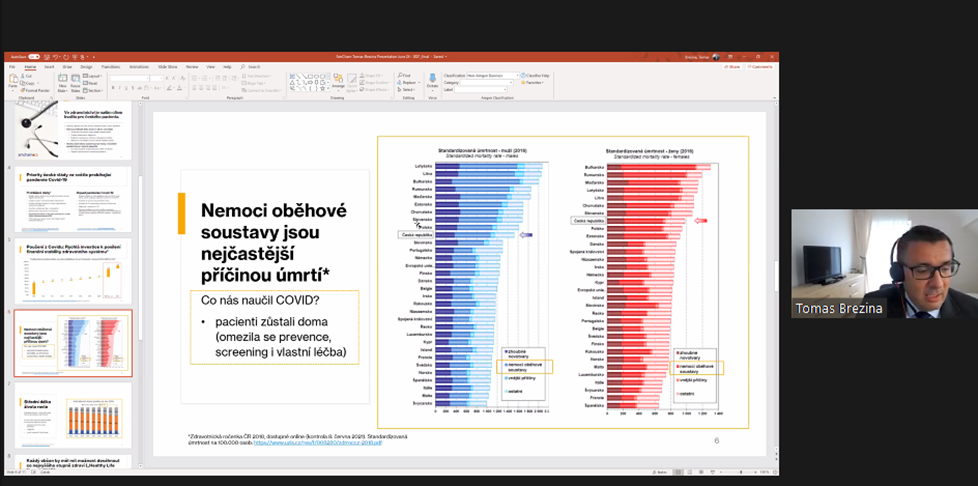 "According to leading experts from the Czech Society of Cardiology and Internal Medicine, we know that many patients have postponed their scheduled preventive examinations due to concerns about Covid, and circulatory system diseases are the most common cause of death in the Czech Republic," he added.
"According to leading experts from the Czech Society of Cardiology and Internal Medicine, we know that many patients have postponed their scheduled preventive examinations due to concerns about Covid, and circulatory system diseases are the most common cause of death in the Czech Republic," he added.
 Martin Koníř of KPMG Czech Republic - also representing the AmCham Health Care Council - also said the lessons that centralizing data processing to become more efficient could be applied by hospitals through the creation of shared service centers. "IT is still not a priority in healthcare. Each hospital is different, but they do many things in the same way. A common, shared services based on contemporary technologies for hospitals can be built rather than separate IT infrastructure for each hospital,“ he said. "If hospitals stopped behaving like competitors, we could create better results for patients today, even with the low level of financial resources for IT that exists today," he added.
Martin Koníř of KPMG Czech Republic - also representing the AmCham Health Care Council - also said the lessons that centralizing data processing to become more efficient could be applied by hospitals through the creation of shared service centers. "IT is still not a priority in healthcare. Each hospital is different, but they do many things in the same way. A common, shared services based on contemporary technologies for hospitals can be built rather than separate IT infrastructure for each hospital,“ he said. "If hospitals stopped behaving like competitors, we could create better results for patients today, even with the low level of financial resources for IT that exists today," he added.
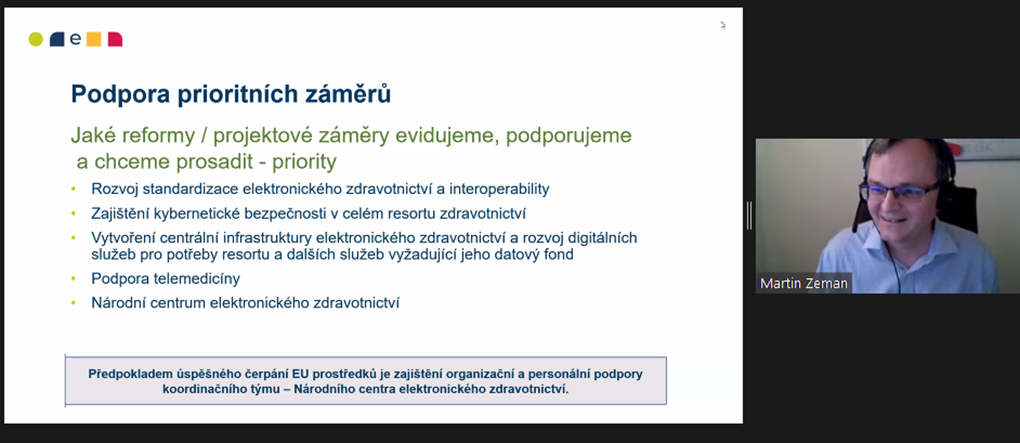 There are no shared strategies or resources, but it is gradually changing, according to Martin Zeman, Chief Digital Officer at the Ministry of Health. All hospitals struggle with the lack of people in IT. Among the priorities of the Ministry are development of standardization of e-health and interoperability, increased cybersecurity in the whole health care sector, central infrastructure for e-health, support of telemedicine and creation of the National center for e-health.
There are no shared strategies or resources, but it is gradually changing, according to Martin Zeman, Chief Digital Officer at the Ministry of Health. All hospitals struggle with the lack of people in IT. Among the priorities of the Ministry are development of standardization of e-health and interoperability, increased cybersecurity in the whole health care sector, central infrastructure for e-health, support of telemedicine and creation of the National center for e-health.
Digital technologies are here, they are penetrating. Our task is to harmonize, set rules for how technologies permeate the healthcare system. There has to be support, regulation, clear direction for use of technologies in health care.
 "The World Bank pointed out that countries with advanced infrastructure and high-quality digital services performed significantly better during the pandemic", said Lenka Axlerová of Microsoft during the conference, and outlined the path to the future: 1. Quality work with data, 2. Continuous improvement of workers' skills on the labor market, 3. Enabling a hybrid way of working, 4. Investing in cybersecurity, 5. Deepening cooperation between the private and public sectors, 6. Utilizing the potential of the cloud.
"The World Bank pointed out that countries with advanced infrastructure and high-quality digital services performed significantly better during the pandemic", said Lenka Axlerová of Microsoft during the conference, and outlined the path to the future: 1. Quality work with data, 2. Continuous improvement of workers' skills on the labor market, 3. Enabling a hybrid way of working, 4. Investing in cybersecurity, 5. Deepening cooperation between the private and public sectors, 6. Utilizing the potential of the cloud.
Lenka has also mentioned that Microsoft and partner organizations have developed a prototype of a digital office in the public sector https://digitalni-urad.cz/#/
 The issue of digitization of the Czech economy has been addressed at the level of legislation, innovation, financial and non-financial support, digital transformation of companies, and via other activities. It's a mosaic and 5G is part of it, Petr Očko, Deputy Minister of Industry and Trade explained during the conference.
The issue of digitization of the Czech economy has been addressed at the level of legislation, innovation, financial and non-financial support, digital transformation of companies, and via other activities. It's a mosaic and 5G is part of it, Petr Očko, Deputy Minister of Industry and Trade explained during the conference.
The Ministry of Industry and Trade supports a wide range of 5G-related activities, the whole ecosystem. "We apply human-centric approach to 5G," he said.
 The Ministry of Industry and Trade has set up the following working groups within their 5G Alliance: WG1 – 5G for Industry 4.0, smart cities, WG2 – Project 5G for 5 cities, the goal is to support the emergence of a digital ecosystem with the city, city-owned companies, industrial, non-industrial companies, operators, universities, etc., WG3 - 5G cybersecurity, WG4 - 5G and disinformation/education, WG5 - in rail, road transport, including cross-border activities.
The Ministry of Industry and Trade has set up the following working groups within their 5G Alliance: WG1 – 5G for Industry 4.0, smart cities, WG2 – Project 5G for 5 cities, the goal is to support the emergence of a digital ecosystem with the city, city-owned companies, industrial, non-industrial companies, operators, universities, etc., WG3 - 5G cybersecurity, WG4 - 5G and disinformation/education, WG5 - in rail, road transport, including cross-border activities.
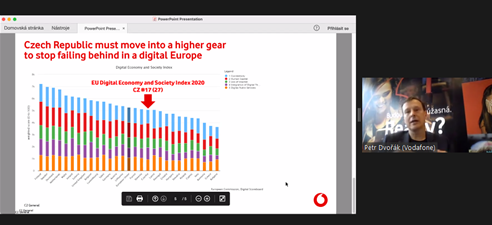 Petr Dvořák of Vodafone explained that the 5G ecosystem means not only infrastructure, network building, but also increasing the level of awareness of the opportunities and use cases that 5G technology offers. Data flows can be up to 100 times faster with 5G compared to 4G. The technology allows connection of several million of devices per 100 km2, including for example autonomous vehicles.
Petr Dvořák of Vodafone explained that the 5G ecosystem means not only infrastructure, network building, but also increasing the level of awareness of the opportunities and use cases that 5G technology offers. Data flows can be up to 100 times faster with 5G compared to 4G. The technology allows connection of several million of devices per 100 km2, including for example autonomous vehicles.
 Within the 5 Cities with 5G project launched by the Ministry of Industry and Trade, "Jeseník was a good example where the Government with experts helped lead a discussion to reduce fake news about 5G," he said. Other cities covered by Vodafone included in the project are Karlovy Vary and Ústí nad Labem.
Within the 5 Cities with 5G project launched by the Ministry of Industry and Trade, "Jeseník was a good example where the Government with experts helped lead a discussion to reduce fake news about 5G," he said. Other cities covered by Vodafone included in the project are Karlovy Vary and Ústí nad Labem.
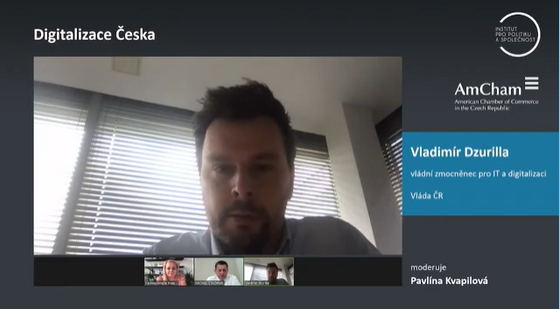
"We monitor European trends and how they develop," he said, adding that he would like to thank AmCham for support in this area.
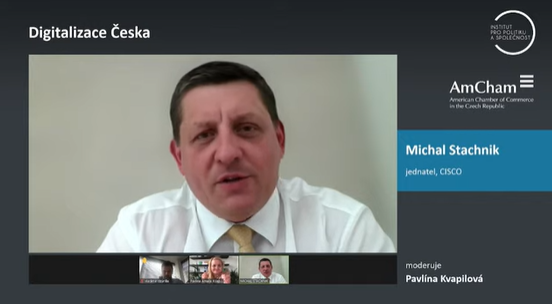 Michal Stachník of Cisco said that during the pandemic, the Government understood cloud is the path to digital transformation. Cloud is a service standardized across states, scalable, and certifications should be consistent across the EU, otherwise, the advantage of the cloud would disappear. "The key thing we should not forget about is security. Security means trust of citizens," he said. Health care is certainly an area where the state should invest in security.
Michal Stachník of Cisco said that during the pandemic, the Government understood cloud is the path to digital transformation. Cloud is a service standardized across states, scalable, and certifications should be consistent across the EU, otherwise, the advantage of the cloud would disappear. "The key thing we should not forget about is security. Security means trust of citizens," he said. Health care is certainly an area where the state should invest in security.
It is necessary to educate and extend the pool of cybersecurity experts in the long run, for example via competitions, academies, general education. "This is something we should work on systematically. There is a huge shortage of experts," he added. Michal has also mentioned that European Cyber Security Challenge, a major event in the sector, will be held this September 2021 in Prague.
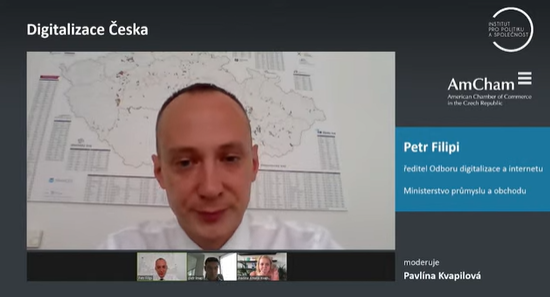 According to Petr Filipi, Director of the Department for Digitization and Internet, the Ministry of Industry and Trade helps build the infrastructure for the digitization of the Czech Republic, especially in localities where it does not pay off for companies financially, as well as supports the digitization of the companies and the business sector. The call within the Digital Enterprise Program (Digitální podnik) will be announced at the end of 2021, initially the allocation will be CZK 300 million, and until 2029, allocation of CZK 8 billion will be available. It is a program for digital transformation of production and non-production processes, in production and services. It also includes logistics processes, cybersecurity (initial audits and implementation of security in companies), in-house connectivity, etc.
According to Petr Filipi, Director of the Department for Digitization and Internet, the Ministry of Industry and Trade helps build the infrastructure for the digitization of the Czech Republic, especially in localities where it does not pay off for companies financially, as well as supports the digitization of the companies and the business sector. The call within the Digital Enterprise Program (Digitální podnik) will be announced at the end of 2021, initially the allocation will be CZK 300 million, and until 2029, allocation of CZK 8 billion will be available. It is a program for digital transformation of production and non-production processes, in production and services. It also includes logistics processes, cybersecurity (initial audits and implementation of security in companies), in-house connectivity, etc.
The Ministry of Industry and Trade supports research, including wages, development of prototypes, also in the area of 5G and 6G, development of technologies, as well as deployment of serial production on the basis of patents. In the area of digitization, it is possible to support the development phase, as well as all other phases, including implementation. The Ministry of Industry and Trade also supports energy savings in companies. The Ministry welcomes suggestions from companies, so that they can better target the support, Petr Filipi concluded.
 Petr Knap of EY Czech Republic talked about digitization of industry and manufacturing. "The success of industrial companies is directly related to the level of digitization and automation," he said. Companies are returning to a relatively busy mode, trying to find ways to increase capacity.
Petr Knap of EY Czech Republic talked about digitization of industry and manufacturing. "The success of industrial companies is directly related to the level of digitization and automation," he said. Companies are returning to a relatively busy mode, trying to find ways to increase capacity.
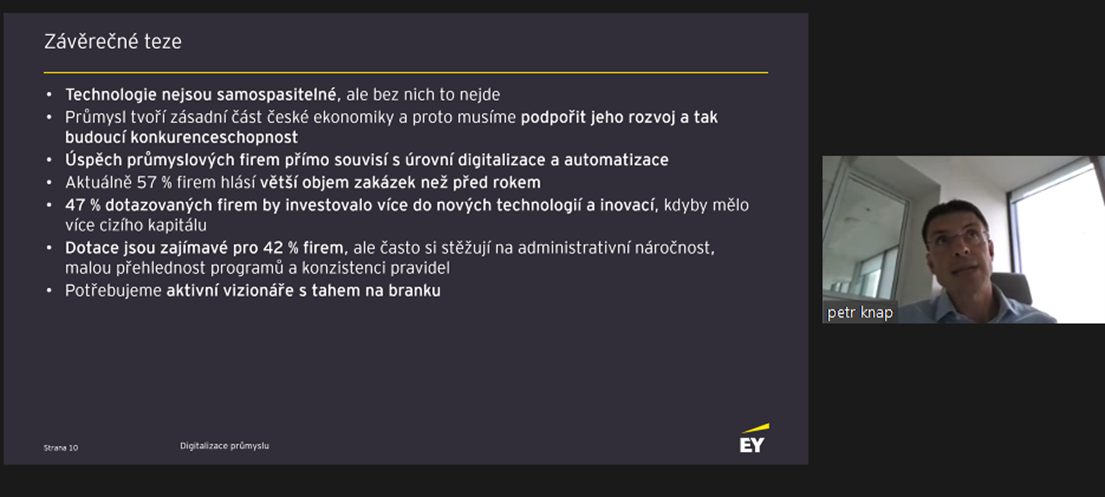 Currently, 57% of companies report higher orders than a year ago, and 47% of companies would invest more in innovation if they had more external capital. Subsidies are interesting for 42% of companies, but they often mention the related administrative complexity, according to EY.
Currently, 57% of companies report higher orders than a year ago, and 47% of companies would invest more in innovation if they had more external capital. Subsidies are interesting for 42% of companies, but they often mention the related administrative complexity, according to EY.
 The DoToho! mentoring program – set up in partnership with AmCham, member companies and Prague City Hall - found that SMEs are interested in online marketing, ecommerce- this is related to the use of technology and this is a trend that Covid started. There are asymmetries in how digital skills are spread, and in the ability to work with digital tools in schools in the Czech Republic, according to Bohumil Kartous of the Prague Innovation Institute.
The DoToho! mentoring program – set up in partnership with AmCham, member companies and Prague City Hall - found that SMEs are interested in online marketing, ecommerce- this is related to the use of technology and this is a trend that Covid started. There are asymmetries in how digital skills are spread, and in the ability to work with digital tools in schools in the Czech Republic, according to Bohumil Kartous of the Prague Innovation Institute.
Talking about the impacts of Covid, Bob Kartous said the Czech Republic was the first country to close the schools and the last one to open them. There have been efforts of some entrepreneurs to launch their own, private schools, create alternatives to the public school system, but this is not a solution, or a way to go, as it would erode social cohesion, which is actually the strength of the Czech Republic, and the country would be less capable of innovating as a result.
 The pandemic highlighted the weaknesses of the Czech education system, including the fact that in terms of preparedness of students for work, supply does not meet demand. "The solution is to work very closely with the private sector," Jana Břeská of Amazon Web Services (AWS) said.
The pandemic highlighted the weaknesses of the Czech education system, including the fact that in terms of preparedness of students for work, supply does not meet demand. "The solution is to work very closely with the private sector," Jana Břeská of Amazon Web Services (AWS) said.
AWS Academy offers ready-made modules for universities and colleges, created by AWS cloud experts. The module can be integrated into existing curriculum. AWS 12-week-long Restart program aims at enhancing cloud skills in broader population. "We believe that this is something we can help with," she added.
Watch full video:
Log In




